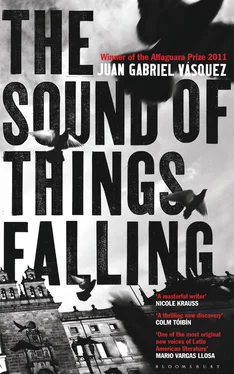‘Uh, what did you want, sir?’
‘Distance DME.’
‘OK,’ says the captain, ‘the distance from, uh, Cali is, uh, 38.’
‘Where are we?’ asks the first officer. ‘We’re going out to. .’
‘Let’s go right to, uh, Tuluá first of all, OK?’
‘Yeah. Where we headed?’
‘I don’t know. What’s this? What happened here?’
The Boeing 757 had descended 3,000 feet turning to the right first and then to the left, but Elena Fritts doesn’t notice. It’s night-time, a dark though clear night, and below the contours of the mountains can already be seen. In the little plastic window Elena sees the reflection of her face, wonders what she’s doing here, if it had been a mistake to come to Colombia, if her marriage can really be repaired or if what her mother said in her tone of an apocalyptic fortune-teller was true, ‘Going back to him will be the last of your idealisms.’ Elena Fritts is prepared to accept her idealistic character, but that, she thinks, is no reason to condemn an entire life of mistaken decisions: idealists also get it right occasionally. The lights go out, the face in the window disappears, and Elena Fritts thinks that she doesn’t care what her mother says: not for anything in the world would she have forced Ricardo to spend his first Christmas Eve in freedom on his own.
‘Just doesn’t look right on mine,’ says the captain. ‘I don’t know why.’
‘Left turn. So you want a left turn back around?’
‘Naw. . Hell no, let’s press on to. .’
‘Where to?’
‘Tuluá.’
‘That’s a right.’
‘Where’re we going? Come to the right now. Let’s go to Cali first of all. We got fucked up here, didn’t we?’
‘Yeah.’
‘How did we get fucked up here? Come to the right, right now, to the right, right now.’
Elena Fritts, sitting in her economy-class seat, doesn’t know that something’s going wrong. If she had any aeronautical knowledge she might find the changes in the route suspicious, she could have recognized that the pilots have deviated from the established course. But no: Elena Fritts does not know anything about aeronautics, and doesn’t imagine that descending to less than 10,000 feet in mountainous terrain can entail risks if one doesn’t know the zone. What is she thinking about then?
What is Elena Fritts thinking about a minute before her death?
The cockpit alarm sounds: ‘Terrain, terrain,’ says an electronic voice. But Elena Fritts doesn’t hear it: the alarms don’t sound where she is seated, nor does she sense the dangerous proximity of the mountain. The crew turns up the power, but doesn’t disengage the brakes. The plane lifts its nose briefly. None of this is enough.
‘Oh shit,’ says the pilot. ‘Pull up, baby.’
What is Elena Fritts thinking about? Is she thinking about Ricardo Laverde? Is she thinking about the looming holiday season? Is she thinking about her children? ‘Shit,’ says the captain in the cockpit, but Elena Fritts can’t hear him. Do Elena Fritts and Ricardo Laverde have children? Where are those children, if they exist, and how had their lives been changed after their father’s absence? Do they know the reasons for that absence, have they grown up wrapped in a web of family lies, sophisticated myths, scrambled chronologies?
‘Up,’ says the captain.
‘It’s OK,’ says the first officer.
‘Pull up,’ says the captain. ‘Easy does it, easy.’ The automatic pilot has been disconnected. The stick shift begins to shake in the hands of the pilot, a sign that the plane’s speed is not enough to keep it up in the air. ‘More, more,’ says the captain.
‘OK,’ says the first officer.
And the captain, ‘Up, up, up.’
The siren sounds again.
‘ Pull up ,’ says the electronic voice.
There is a faltering scream, or something that sounds like a scream. There is a sound that I cannot or have never been able to identify: a sound that’s not human or is more than human, the sound of lives being extinguished but also the sound of material things breaking. It’s the sound of things falling from on high, an interrupted and somehow also eternal sound, a sound that didn’t ever end, that kept ringing in my head from that very afternoon and still shows no sign of wanting to leave it, that is forever suspended in my memory, hanging in it like a towel on a hook.
That sound is the last thing heard in the cockpit of Flight 965.
The noise sounds, and then the recording stops.
It took me a long time to recover. There’s nothing as obscene as spying on a man’s last seconds: they should be secret, inviolable, they should die with the man who dies, and nevertheless, there in that kitchen in that old house in La Candelaria, the final words of the dead pilots came to form part of my experience, in spite of the fact that I didn’t know and still don’t know who those unfortunate men were, what they were called, what they saw when they looked in the mirror; those men, for their part, never knew of me, and yet their final moments now belong to me and will continue to belong to me. What right do I have? Their wives, their mothers, fathers and children haven’t heard these words that I’ve heard, and have perhaps lived through the last two and a half years wondering what their husband, or father or son had said before crashing into El Diluvio Mountain. I, who had no right to know, now know; they, to whom those voices belong by right, do not know. And I thought that I, deep down, had no right to listen to that death , because those men who died in the plane are strangers to me, and the woman who was travelling behind them is not, will never be, one of my dead .
However, those sounds now form part of my auditory memory. Once the tape fell silent, once the noises of the tragedy gave way to static, I knew I would have preferred not to have listened to it, and I knew at the same moment that in my memory I would go on hearing it for ever. No, those are not my dead, I had no right to hear those words (just as I probably have no right to reproduce them in this story, undoubtedly with some inaccuracies), but the words and the voices of the dead had already swallowed me like a whirlpool in a river swallows a tired animal. The recording also had the power to modify the past, for now Laverde’s tears were not the same, couldn’t be the same ones I’d witnessed in the Casa de Poesía: now they had a density they’d previously lacked, owing to the simple fact that I’d heard what he, sitting in that soft leather armchair, heard that afternoon. Experience, or what we call experience, is not the inventory of our pains, but rather the learned sympathy towards the pain of others.
With time I have found out more about black boxes. I know, for example, that they’re not black, but orange. I know that aeroplanes carry them in the empennage — the structure we profane people call the tail — because they have a better chance of surviving an accident there. And yes, I know that black boxes survive: they can withstand 2,250 kilograms of pressure and temperatures of 1,100 degrees Celsius. When they fall into the sea, a transmitter is activated; the black box then begins to pulsate for thirty days. That’s how long the authorities have to find it, to discover the reasons for an accident, to ensure that nothing similar happens again, but I don’t think anyone considers that a black box might have other fates, to fall into hands that were not part of its plan. However, that’s what happened to me with Flight 965’s black box, which, having survived the accident, was magically transformed into a black cassette with an orange label and went through two owners before coming to form part of my memories. And that’s how this apparatus, invented to be the electronic memory of planes, has ended up turning into a definitive part of my memory. There it is, and there’s nothing I can do. Forgetting it is not possible.
Читать дальше












